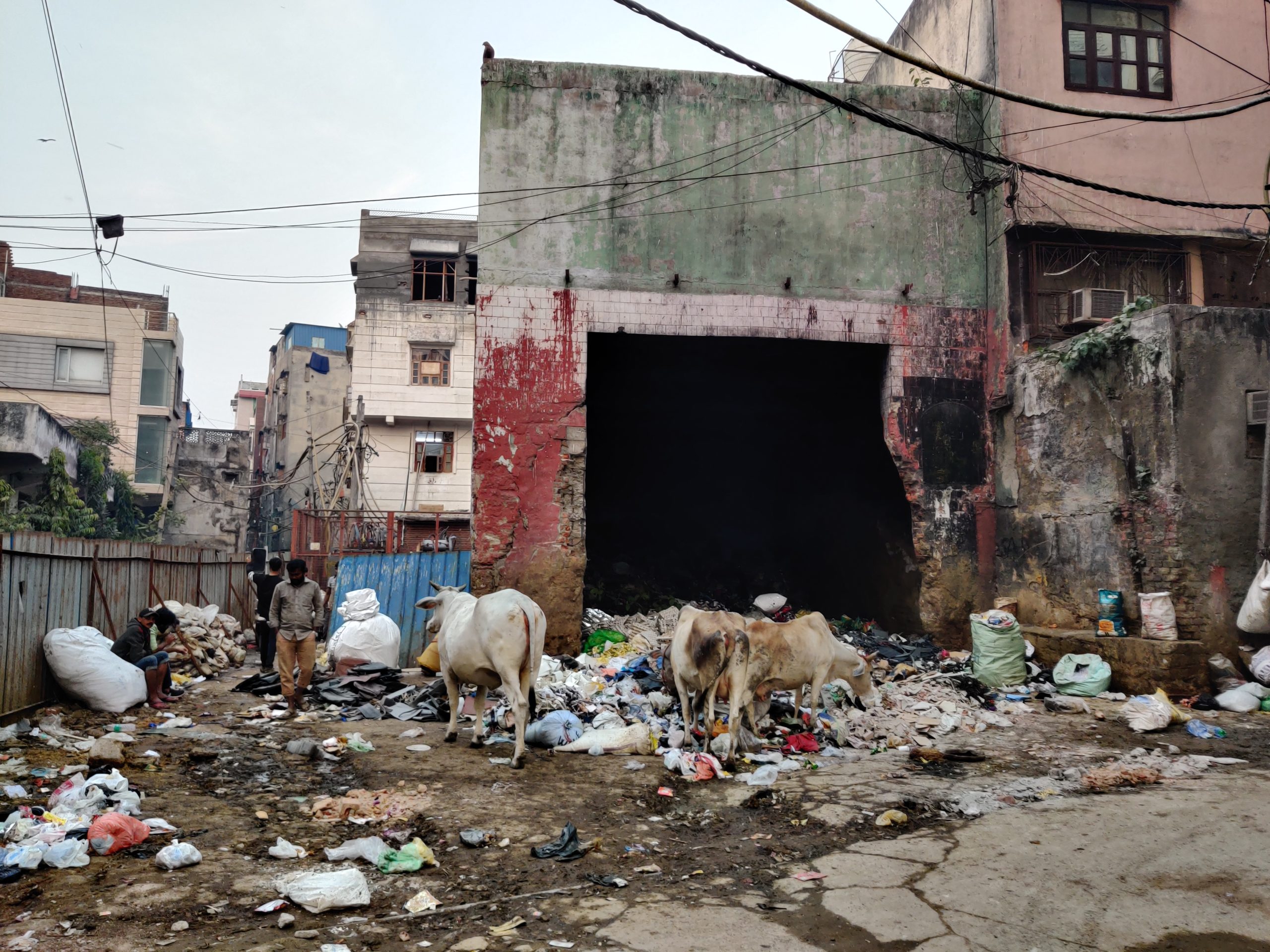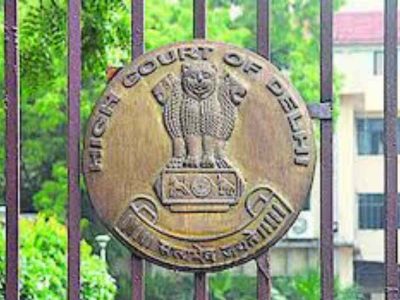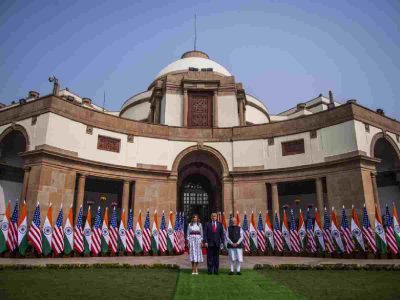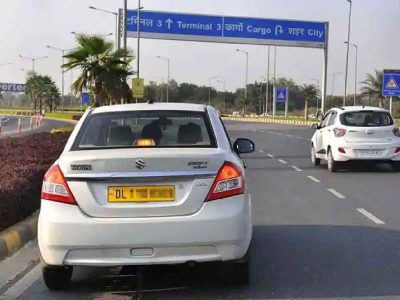According to the latest data by Praja foundation, in SDMC five councilors scored an “F”, while both in NDMC and EDMC – three had fared poorly. Patriot takes a look at the districts under these lowest scoring MCD’s jurisdiction to find the reason behind their mismanagement
Several councillors from each of Delhi’s three municipalities – North MCD, South MCD and East MCD – have failed in their duties, according to data obtained through RTIs on Municipal Corporation of Delhi’s functioning from 2017 and 2021. The report card finds the bottom ranked councillors are: Shaheen of the AAP from North MCD, Chander Prakash from South MCD and Parveen from East — both from the Congress party.
This report by Praja foundation comes at a time when elections of the municipal corporations are months away in April’ 2022, and political parties will fight to get control. Since 2017, the BJP which rules the Centre has been in control of the municipalities in the Capital, with its three mayors at the helm. The last few years have seen complaints against the municipalities for delaying salaries of its employees, and the AAP-led Delhi government blaming the MCDs for this financial debt and for corruption.
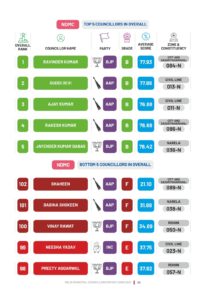


And they are unlikely to let go of that. The want for the seats and the strategy to win them can be seen in the fact that AAP began its campaigning for municipal elections in January. It carried out 2,500 mohalla sabhas (public meetings) across Delhi between January 7 and 15 to highlight what it called alleged rampant corruption within the BJP-ruled MCDs. At the same time, the BJP too led a campaign to demand stalled funds of corporations from the Delhi government in the same month.
During that time, in our conversation with AAP’s MCD in-charge Durgesh Pathak, he had said their motive for the mohalla sabhas was to spread the word about how important the polls are and how badly the BJP was failing in its role. “People still don’t know the various agendas and roles the MCDs take,” Pathak pointed out, adding that for 15 years the BJP sat in this seat of power but this time they would be out.
Congress on its part led a campaign called ‘Pol Khol Yatra’ on October 25 to raise what it called corruption, inaction and incompetence of the BJP and the AAP. Taking these into perspective, the report that Praja has put forward puts things into perspective for voters.
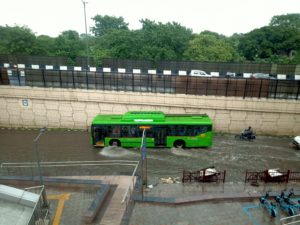
It highlights the responsibilities that MCD councillors are placed with and exactly how they have delivered on these since coming to power. It says that the parameters to grade them is based on comparing issues raised by councillors related to the citizen complaints, which again is based on the data collected by RTIs filed to all 12 zones of the Municipal Corporation of Delhi.
The areas which come under the jurisdiction of these MCDs are as follows: buildings, drainage, estate, garden, licence, pest control, shops, and establishment (S&E), solid waste management, storm water drainage, toilet, etc.
Of the three worst performers in Municipalities, Parveen of Mustafabad in East MCD’s Shahdara, was found to have raised zero issues. The Congress representative scored an obvious zero out of 14 on the numbers of issues raised, and zero again on the importance of issues raised, failing on all counts except on one which took criminal records under consideration — where Parveen had none.
The only time she didn’t top the list of the bottom most councillors of EDMC was in the part of attendance, where Neema Bhagat of the BJP topped the list.
Mustafabad, which Parveen presides over, has one of the worst roads — and the overflowing sewage system only decries the apathy of those in-charge. This has been the case before the Lok Sabha elections in 2019, and even after the Assembly elections of 2020. This was also the site of deadly communal riots of 2020, and despite a lot of attention to this area it has not helped in its municipality to straighten things up.
Next, we come to Chander Prakash of SDMC who received .38 out of 14 for issues raised (which were 10 in total) and a score of 4.22 for importance of issues raised out of 33. He is the counsellor of Govindpuri, an area, much like the others rife with overflowing sewage, and accumulating piles of garbage on roads. Just 150 to 200 meters away from Govindpuri Metro station of Delhi, on a road leading to Kalkaji one can find piles of garbage. But it is not the only area of SDMC where waste piles up. In areas like Munirka, Lado Sarai, and even Saket — the problem of unattended garbage remains the same.
“MCD periodically takes waste from our area. All waste comes to one place and then MCD trucks load everything and take it,” said Vijay Dhaiya, a resident of Munirka. “Our biggest problem is sewerage, and drainage. Every year during monsoon, water logging happens and movement in Munirka becomes very tough.”
“We send complaints, sometimes they get addressed soon, while in some cases we wait,” he adds. Not just that, though SDMC is considered better off as most of the areas under SDMC are posh but still the problem of unclean public toilets, and the stench emitting from them is quite common.
Failure in resolving the issues related to garbage, sewage, waterlogging are the reasons for the lowest rating of the councillor from Govindpuri, Chander Prakash. Just above him Suresh Choudhary of Sangam Vihar, too couldn’t meet the expectation of people. The margin among lowest performing councillors in their ratings is very less. Other three who performed poorly but were better than above too were Neelam from Najafgarh, Poonam Solanki from Baraula, and Neetu from Sarita Vihar.
Lastly, from NDMC Shaheen was the lowest scorer. In the number of issues raised she scored .21 after raising 21 issues. Out of the importance of issues raised she scored a lowly 4.07.
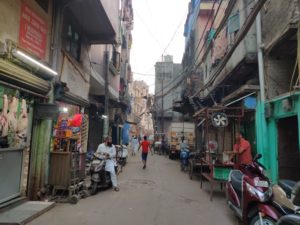
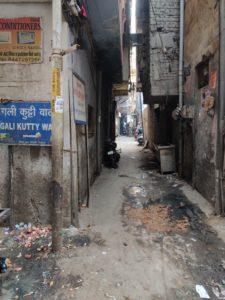
At Shaheen’s constituency, we met residents and even police personnel who told us that it was her husband who acted as the councillor and not her. Residents were not happy with her response nor her husband’s, and we found street corners riddled with garbage — and one main garbage dump in a bad shape. There are butcher shops in the vicinity, which are ill-maintained with no proper waste management, leading to strong rotten meat stench and eagles waiting to get their meals.
Clearly, the analysis of the report cards from April 2017 to March 2021 brings to light the fact that councillors are not raising issues relevant to, and based on, the complaints and issues raised by citizens. Our own ground work proves that the issues at hand are not addressed. This analysis however is not to say only these three counsellors failed. In fact, there were many. The report found that councillors from all three MCDs received an average score of just 38.26% in April 2017 to March 2021, in ‘issues raised’ when compared to citizens’ complaints, on various civic issues.
In SDMC, there were a total of five counsellors who fared an ‘F’ grade. In NDMC and EDMC there were three each who failed which can be seen in the graphics provided.
Milind Mhaske, Director, Praja Foundation, told us that the overall performance of councillors was not good. “Councillors do not raise relevant questions. They either focus one type of question, for instance on the issue of parks or raise questions that are remotely connected to them like farmer’s protest.”
But raising questions pertinent to civic problems doesn’t decide the popularity of a councillor in their constituency. Interestingly, they can still be popular. “Many politicians are social workers too. People consider councillors good, only if they are close to them. If a councillor doesn’t reach a gathering of somebody’s death in their constituency, people say that councillors aren’t good but that is a wrong narrative. His duty is to raise questions of their constituency in the house.”
Mhaske explains that their ratings are done by weighing the number of issues raised against the number of complaints lodged by constituents on that issue. “Some of the tangible parameters like an elected Municipal Councillor’s attendance in the Corporation and the Committee Meetings, the number of issues she/he has raised in these forums, importance of those issues, and utilisation of the funds allotted to her/him.”
“For example, there are complaints on these five issues: water, drainage, sewerage, garden and road in an area, for instance 100 related to drainage and 20 related to road. And a councillor raised 10 questions, and out of them eight were about water only. So, we check proportionality in these questions.”
On the question of whether the councillors of the ruling party get more funding or not, Mhaske said, “It is there in every city. The ruling party gets preferences in the allotment of funds to some extent. But every councillor has a discretionary fund also. So discrimation on the basis of party doesn’t seem to be here.”
On average though, what could be seen was that councillors of the BJP were faring better. The question remains, were funds distributed according to party affinity? Mhaske says that is not the case. “The biggest problem is that our councillors don’t participate in the budget making process. If they push a good and proper proposal, usually they get the funds.”
“Usually Delhi’s MCD budget comes around December/January. And four to five months before that, various committees of the house ask councillors to share their budgets. But Many councillors don’t know how to get funds. What they do, they share their demands in a letter, like for example a garden is to be made. This is not the way it happens. If a garden is to be made, do you have any reservation for that? You have to do tendering. It requires planning with proper follow- up. So only senior councillors who have a team do that,” and they get funded easily.
While we focussed on the bottom three, Praja also pointed to the top players in the MCDs. None, however, received a grade ‘A’. Those who managed the top positions were rated in the category of grade ‘B’. These were Ravinder Kumar of NDMC from the BJP, Abhishek Dutt of the SDMC from the Congress, and Sanjay Goel of the EDMC from the BJP. However, the overall performance of councillors remained poor.
(The sorry sight of a garbage dumpyard at Quresh Nagar / Credit: Sashikala VP)

